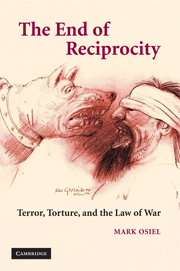Introduction
Published online by Cambridge University Press: 05 June 2012
Summary
What treatment is fitting for high-ranking Al Qaeda suspects who can be detained or located, who repudiate humanitarian law, and who qualify as neither prisoners of war nor protected civilians under the Geneva Conventions? Such persons undoubtedly have information about terrorist organizations and plans that could be useful in preventing mass atrocity. If militant jihadists continue to threaten the United States with attacks on the scale of 9/11, is it defensible to detain hundreds of such individuals indefinitely? And may such groups' leaders be killed at any time, even when far from any combat? More generally, when may a country at war expect the enemy to reciprocate its own restraint in following the law of armed conflict? And if the enemy will not exercise a similar forbearance, at what point (and in what ways) is the law-abiding state released from its normal legal duties, to restore a tactical and moral symmetry in confrontation?
The law of war rests on certain assumptions not immediately applicable to America's conflict with Al Qaeda and kindred groups. Within such law, for instance, the justice of a country's cause is irrelevant to how enemies should treat that country's soldiers. Conscripts are often the innocent means by which unjust rulers pursue their ignoble ends. Even enlistees in a wrongful cause are generally misguided dupes of well-intentioned nationalist ardor, aroused by powerful leaders employing state censorship and propaganda. Such leaders remain the true culprits, behind the scenes.
- Type
- Chapter
- Information
- The End of ReciprocityTerror, Torture, and the Law of War, pp. 1 - 28Publisher: Cambridge University PressPrint publication year: 2009

